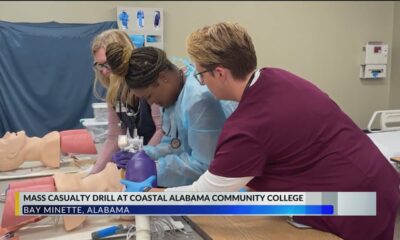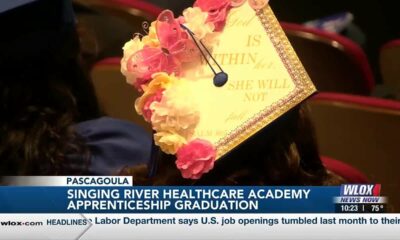Mississippi News
House, Senate take different paths on spending federal funds
House, Senate take different paths on spending historic federal funds
Mississippi House members are developing a framework of how they want to spend $1.8 billion in federal COVID-19 relief funds, but seem content on waiting until the end of the session to reveal specifics.
Senate leaders, on the other hand, have released their plans on how to spend the American Rescue Plan funds and have begun passing them.
The dueling strategies will almost certainly lead to end-of-session negotiations between a handful of leaders from both chambers, and it will likely be weeks before Mississippians learn how lawmakers will decide to spend the historic amount of federal funds.
The House is passing bills, but for the most part they are not placing the exact amount of funds in the bill. House Pro Tem Jason White, R-West, said those exact amounts will be worked out in conference between House and Senate leaders at the end of the session.
On Tuesday, the Senate passed its largest ARPA bill — a measure to use $750 million of the money to create a state match for city, county and rural water association infrastructure projects. The state would match local governments’ spending of the ARPA funds they are receiving directly from the federal government. Federal law allows the ARPA funds to be used for local governments’ water and sewerage infrastructure.
Senate Bill 2822 would provide a dollar-for-dollar match to counties and large cities for qualified water, sewerage and stormwater projects. For smaller cities that are receiving less than $1 million in direct ARPA money, the state would match qualified projects $2 to $1. For rural water associations with 250 or more customers, the program would provide grants of up to $2.5 million for qualified projects.
READ MORE: Senate unveils plan for spending $1.8 billion in federal pandemic stimulus
Sen. John Polk, chair of the Senate subcommittee handling ARPA spending, said the Mississippi Department of Environmental Quality, with help from the Department of Health, would vet and approve applications for projects, based on a grading scale. Polk said this grade would include whether a system is under federal orders to improve or having problems such as high lead levels, and it would give greater weight to projects “ready to go within six months.”
Sen. Derrick Simmons, D-Greenville, said the state fund should focus first on water and sewer systems in the worst shape, and in communities that can least afford upgrades. Sen. John Horhn, D-Jackson, said those under federal orders to upgrade should get top priority.
Polk said the grading system — and $2-to-$1 match for smaller cities — would address those issues to some extent but, “We have to keep it fair for everyone. Every area has needs.”
Sen. David Blount, D-Jackson, said, “I think this bill, along with the appropriations bill to follow, is the most important thing we will pass this session. We need to look at this as one-time money that we will probably never see again.”
Blount asked Polk whether the proposed ARPA spending would be enough to fix water and sewerage problems and needs in Mississippi.
“I do not,” Polk said. “I know, for instance, the rural water associations told us they would need about $700 million to cover all they need.” But, Polk said, “I’m not convinced that this is a state problem” and that local governments should do a better job of keeping up water and sewerage infrastructure.
The Senate passed on to the House several other ARPA spending bills on Tuesday, including a measure that would provide up to $10 million for infrastructure projects at private colleges, one that would provide death benefits for first responders who die from COVID-19. The chamber also passed Senate Bill 2721, an ARPA workforce bill that would provide training, loan repayment and enhanced pay for nurses and other health workers.
In the House, White said the focus of the spending of the federal funds should be on helping local governments with their water and sewer needs and helping health care entities that have been impacted by the COVID-19 pandemic.
“There is a pandemic. We have the money because of the pandemic, so we ought to spend at least some it to help with the pandemic,” he said.
White said he does not know of an area where the one-time funds can have more of an impact than on local water and sewer needs. He said he envisions $400 million to $600 million being put in that area in the first year. White also said he does not necessarily believe all of the funds should be spent during the 2022 session.
Legislation that has passed the House:
- Would create a funds to help rural water associations with their infrastructure. It would require no matching funds.
- Would create a program to help municipalities and counties with their water and wastewater infrastructure, requiring a 20% match from the local governments.
- Would create a funds to deposit funds to aid the city of Jackson with its water and wastewater infrastructure. The city, to receive the funds, would have to commit to providing regular reports to the state on how the money was being spent.
The outdated Jackson water system is under scrutiny from federal officials who have expressed concern about the quality of the city’s water. Plus, the system routinely breaks down during extreme cold weather.
Rep. Chris Bell, D-Jackson, said negotiations are ongoing on the amount of state support the city will receive. But he said communications between city officials and legislative leaders in determining the amount of help the city will get are currently positive.
“Absolutely, they are good,” he said.
The House has also passed legislation that would provide local law enforcement and firefighters (including volunteers) $1,000 in premium pay for their efforts during the pandemic. And hospitals could receive grants of up to $250,000 to help with treatment of coronavirus patients. Those funds could be used to help pay their health care staff.
Plus, a program would be established under legislation that has passed the House to develop a plan to expand nursing programs at community colleges. The Senate is proposing similar spending for nursing programs.
FOLLOW THE MONEY: Tracking Mississippi’s historic influx of federal cash
This article first appeared on Mississippi Today and is republished here under a Creative Commons license.
Mississippi News
Events happening this weekend in Mississippi: April 25-27
SUMMARY: This weekend in Mississippi (April 25-27) features a variety of events across Central and Pine Belt regions. Highlights include MiraGotSoul at Vibe Studio in Jackson, a community Dinner and Movie in Clinton, and the Natchez Kite Festival. Enjoy live performances with Sweet Lizzy Project in Natchez and the New Bourbon Street Jazz Band in Clinton. Family-friendly activities include the Native Plant Fest and Community Farmers Market in Jackson. In Hattiesburg, catch the Henry Cho tour and the Downtown Crawfish Jam Music Festival. Overall, it’s a weekend full of entertainment, culture, and fun activities for all ages.
The post Events happening this weekend in Mississippi: April 25-27 appeared first on www.wjtv.com
Mississippi News
Events happening this weekend in Mississippi: April 18-20
SUMMARY: This weekend (April 18-20), Mississippi offers a variety of events for all ages. In Jackson, enjoy Food Truck Friday, a jazz concert, free outdoor movie screenings, and multiple exhibitions including “Of Salt and Spirit” and “Hurricane Katrina: Mississippi Remembers.” For family fun, there’s an Easter Egg Hunt at the Ag Museum and “Bunnies & Butterflies” at MCM. Natchez features the Spring Pilgrimage, Lafayette’s 200th anniversary celebration, and a farmers market. In the Pine Belt, highlights include Live at Five, a Spring Candle-Making Workshop, and Easter events at the Hattiesburg Zoo. Don’t miss the Bluff City Block Party and more!
The post Events happening this weekend in Mississippi: April 18-20 appeared first on www.wjtv.com
Mississippi News
Events happening this weekend in Mississippi: April 11-13
SUMMARY: This weekend in Mississippi (April 11-13), enjoy a variety of events across the state. Highlights include the Eudora Welty Birthday Bash in Jackson, Trivia Night at the Mississippi Museum of Natural Science, and Boots & Bling Fundraiser in Natchez. For family fun, check out the Bunny Bonanza in Jackson or the Easter Egg Hunt in Clinton. The Natchez Concours d’Elegance Car Show and Stranger Than Fiction Film Festival offer cultural experiences, while the 12th Annual Dragon Boat Regatta in Ridgeland and the Hub City Classic Car Show in Hattiesburg provide exciting activities for all ages.
The post Events happening this weekend in Mississippi: April 11-13 appeared first on www.wjtv.com
-

 News from the South - Florida News Feed7 days ago
News from the South - Florida News Feed7 days agoJim talks with Rep. Robert Andrade about his investigation into the Hope Florida Foundation
-

 News from the South - Alabama News Feed5 days ago
News from the South - Alabama News Feed5 days agoPrayer Vigil Held for Ronald Dumas Jr., Family Continues to Pray for His Return | April 21, 2025 | N
-

 Mississippi Today6 days ago
Mississippi Today6 days ago‘Trainwreck on the horizon’: The costly pains of Mississippi’s small water and sewer systems
-

 News from the South - Florida News Feed5 days ago
News from the South - Florida News Feed5 days agoTrump touts manufacturing while undercutting state efforts to help factories
-

 News from the South - Texas News Feed6 days ago
News from the South - Texas News Feed6 days agoMeteorologist Chita Craft is tracking a Severe Thunderstorm Warning that's in effect now
-

 News from the South - Arkansas News Feed7 days ago
News from the South - Arkansas News Feed7 days agoAs country grows more polarized, America needs unity, the ‘Oklahoma Standard,’ Bill Clinton says
-

 News from the South - Missouri News Feed21 hours ago
News from the South - Missouri News Feed21 hours agoMissouri lawmakers on the cusp of legalizing housing discrimination
-

 News from the South - Florida News Feed5 days ago
News from the South - Florida News Feed5 days agoFederal report due on Lumbee Tribe of North Carolina’s path to recognition as a tribal nation

















































